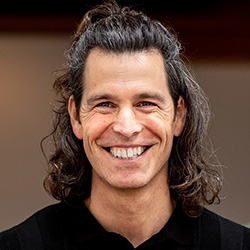
Search Results: helping
-
Trainer Tip: Sometimes when we look to fix someone's problems we think we're doing it to make them feel better, but in reality we are uncomfortable and we want to feel better. Instead of assuming you know what their problem is or what they need, listen deeply. Your listening presence can bring relief to the both of you and provide additional opportunities for healing. And along the way they may find their own way to a solution.
-
- Tune into your self-dialogue with a compassion that supports loving presence
- Shift limiting beliefs about your parenting patterns so you can choose consciously
- Transform frustration, confusion, or guilt into constructive, honest discussions
- Foster your ability to say yes and no in a way that supports your natural limits
-
Trainer Tip: We all have different ways to meet our need for rest. It's important to notice when you need that time. You might know you need rest when you find yourself snapping at people on the phone, when you snap at your cat, or when you ignore your partner. Rather than behave in ways that you might regret, consider doing something that will help you meet your need for rest. Everyone in your life will benefit.
-
This anecdote illustrates how a young man had the social awareness to consider how male conditioning may bring up competitiveness in his interactions with another man. The young man offered transparency and checked for consent in a way that shows an embodiment of power-with, togetherness, consideration, care, collaboration... and all without displaying any formal NVC training, and without looking to impress.
-
Discover how the perennial strength of compassion and the living energy of needs can help you develop resilience in order to remain present with yourself and others amidst today's challenges.
-
When a person of color (A.K.A. a person from the Global Majority, or GM) tells a marginalization story that triggers a defensive response from a white participant in a group, to foster awareness and healing, leaders can address the white person's distress with empathy, highlighting the common dynamic of prioritizing white pain. From there, leaders can offer GM participants opportunity to share their experience and make requests of the group.
-
- Reclaim the lost voices of your ancestors
- Understand the impact of collective trauma on your family line
- Open yourself up to have more warmth for yourself and your children
- Restore the flow of love and energy from past generations
-
-
Dear friends,
I greatly enjoyed my annual New Year’s Peace Meditation yesterday. It always brings together NVC enthusiasts from across the world and is one of my favorite traditions for welcoming the New Year!
How was 2024 for you? For me, it was a bumpy ride. There were moments of joy spending time with our 3-year-old grandson, mine and Kim’s first international trip together (a bonafide vacation that was void of work), and precious time with family and friends. There was also heartbreak...
-
Would you like to learn how to:
- Use line and color to deeply connect with the feelings and needs that are alive for you ?
- Find a way forward that comes from your creative self ?
- Meet your creative self, even if you have never had the pleasure of meeting it before ?
Come join Olga Nguyen for Neuroart / Visual NVC– even if you have never drawn or painted before, and even if you are a professional in the midst of a creative block!
-
- Discern what is preventing your communication style from being effective
- Create a communication style that works
- Resolve everyday conflicts and misunderstandings
- Create a deeper sense of connection, trust, and cooperation
- Heal old wounds between you and others, as well as within yourself
- Be the leader and contributor you want to be in any situation
-
One way of simplifying decision-making in relationships is clarity about the level of contact and connection you want with the people you interact with. This means knowing what you want and don’t want to share, the kinds of activities you do and don’t do together, how often, etc. This can help you chose how to best support your needs in that context, and help you to remember to set life-serving boundaries when you need them.
-
Here are seven self inquiry questions. Half of them can help you assess your NVC consciousness. The other half can help you move from pain, fear, resistance, judgement, criticism, and shame – to love, compassion, understanding, appreciation, curiosity, and more.
-
Shifting to a needs-based perspective is one of the most powerful—and challenging—aspects of integrating Nonviolent Communication (NVC) into daily life. In this short video, Mary Mackenzie offers three simple, practical tips to help you cultivate needs consciousness and transform how you experience your world and relationships.
-
Read how an American Buddhist NVC teacher with Jewish roots reflects on how any dehumanization in the Israel-Hamas conflict can be used to justify all kinds of violence that can escalate for generations. With acknowledgment of the complexities, his desire is for us to bring in respect, dignity and peace -- for both Israelis and Palestinians. He emphasizes compassionate advocacy of all humanity amid the ongoing crisis.
-
Ask the Trainer: For many years I have been using crime and punishment (reward and consequences) to discipline because it was the only thing I knew. I knew deep in my heart it was alienating me...
-
Trainer tip: Empathy is about being present to a person’s feelings and needs. It is acknowledging another’s experience, not necessarily agreeing with it. If you have a different opinion than another, empathize with her first. Then, state your feelings and needs with regard to the situation.
-
Trainer tip: It's often easy for us to hear rejection when someone says “no” to us. If we focus on the rejection, we may feel hurt and fail to take the time to understand what is going on with them. However, if we focus on their feelings and needs, we're more likely to uncover what they want and what prevents them. To increase success in resolving conflicts and find solutions that work for everyone, hear the “yes” behind their "no".
-
Trainer Tip: Sometimes you might find yourself in a situation where your need for love is not met. Consider ways in which a partner or friend could meet your need for love. Be sure to request something the other person is capable of doing. Whatever the situation, it is our responsibility to clarify how we can meet our need for love, while also considering the abilities of our loved ones to comply with our requests.
-
Roxy Manning emphasizes positive relationships in parenting, highlighting acceptance, understanding, and compromise. She stresses the importance of being aware of one's needs, attuning to the other person's needs, fostering trust, and encouraging open communication, especially with children. The approach involves a balance between meeting both sets of needs for a healthier dynamic.





















